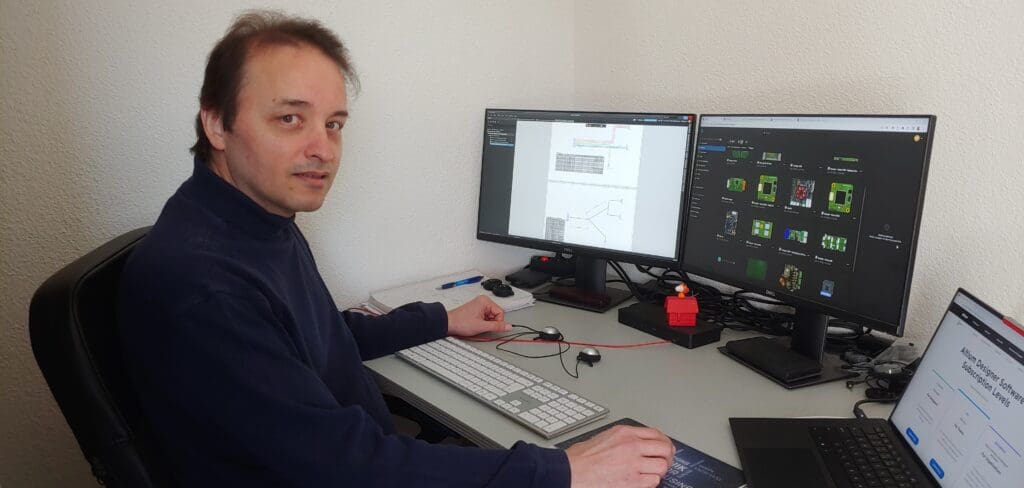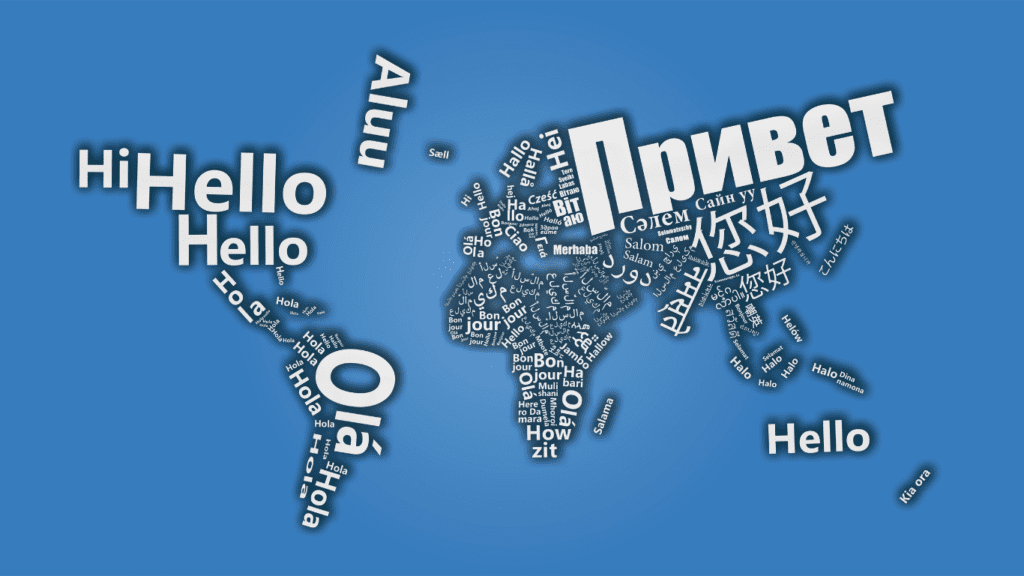Life as a sales engineer with language and intercultural skills
Manuel Alberto Valero Uribe grew up in Mexico, studied Electronic Engineering, speaks four languages. Manuel is now living and working in Bavaria in Germany. He has worked in different engineering roles as well as in marketing and sales. Now, Manuel works for Altium as a Technical Sales Engineer. In this article he shares his experience and advice about intercultural skills and languages.
Manuel Alberto Valero Uribe discusses Intercultural skills, languages, and sales engineering
In an earlier article, Manuel shared his work experience:
Manuel Alberto Valero Uribe – Technical Sales Engineer for Altium PCB design tools


Cultures and language skills for sales engineering
You have lived in Mexico, Italy, and Germany. What are the positives of living in different cultures and how does this transfer into your working life?
This question would require quite a long answer. Even if it might sound like a cliché, this broadens the views and understanding. This is not just from a personal and cultural point of view, but also from the professional one. There are many styles of getting things done and it is interesting and enriching, albeit not easy sometimes.
It is possible to gain a much more enriching and deeper understanding of another culture, not obtainable with mere holiday trips. There is indeed a “culture shock” at the beginning. However it is possible to enjoy and enrich ourselves with it; learning from all the positive things (including those in our life) and also the negative ones (avoiding such mistakes). For example, I collected many recipes and cooking styles from my years in Italy and also showcased real Mexican cooking to others.
All the cultural details, language expressions and ways of living help to connect with the people of those places and make closer human relationships. That is a really useful tool when working with individuals from different cultures.
Culture is a big part of people’s life, and it is a very useful “tool” for many aspects of life. In addition, it also broadens our own life and perspective because we tend to live in a local culture “bubble”. This is true even for countries, where the culture might vary greatly from place to place.


Learning multiple languages
You speak and present in four different languages. What is your advice to other engineers about learning languages?
Yes, I do present in all four of them, but mostly in English. I mostly present in the other languages internally and sometimes when I cover colleagues in other parts of the world.
I have a personal point of view on this, and I have known lots of people within the profession, that speak more languages than me.
English is the de-facto standard for international communication and the most widely used language for electronics. I think that learning another language is like learning a new skill in our profession. Sometimes it is just necessary. Since we are problem solvers and learning another language serves to solve a problem, it has to be done.
Also, learning languages is part of knowing another culture and it is practically a must if someone moves to another country.
I suppose that everyone has preferred ways to learn. For myself I am very comfortable learning in a school; this was the case for German, and there are several reasons for that.
Learning English
I improved my English quite dramatically when I was 15 years old because I badly wanted to read an old electronics magazine. I published this on LinkedIn.
Learning English from Popular Electronics May 1977
So, I simply grabbed the magazine and started to read with a English-Spanish dictionary by my side to look for the words I did not know. Of course, it took me months, but I learnt a lot. I suppose that would translate to: find some topic that you really like and try to read something on that topic in the language that you want to learn.
Italian is quite similar to Spanish, and I learnt it via full immersion with the help of English, which is also a Latin language in some ways. When I moved to Italy, I did not take a single Italian course, I just lived and worked there.
Now I have a relatively easier time understanding other Latin languages, like Portuguese, French, Catalan and a bit of Romanian.
A big part of learning a new language is “to train” the “ears” (more like train the brain). The TV (or YouTube, or similar things) is great for this; our brains are wonderful at finding correlations and we learn our mother language in this way.
Communication skills as a sales engineers speaking multiple languages
How has living in different countries and speaking four languages made you a better communicator?
When we learn a new language, we should also learn from that language’s cultures. This is practically unavoidable when people move abroad, at least if people don’t want to remain isolated. So, we continuously receive bits of the local culture while interacting with locals: idiomatic expressions, responses that differ from those of other cultures, etc. After some time, we are usually able to interact and sometimes mix with locals; thus, enjoy all the differences and cultural expressions that the other culture can offer.
Every new language learnt creates a nice and complex structure in our brains and this eases the task of learning another new language. It might not sound intuitive, but that is the way I perceive it.
Using all of this, improves communication with a broader spectrum of people.


Customer facing roles
You have worked as an engineer but also in customer facing roles. What do you think makes the type of engineer who can become more customer facing? Why would you recommend these roles?
I am a designer; I have no doubt about this. However, there has been a huge part of my professional life where I developed my profession as an independent engineer and even had small businesses, so facing the customer was a must. This part of my professional life tends to be “minimized” by the companies I have worked for, but anyone with such experience can work wonders when facing customers.
There are cultures that are more “open” or “chatty” and I come from one of those. Nevertheless, I used to be much more discrete as a person; moving to another country made me change that.
There might be several reasons why someone could be attracted to customer facing roles:
cultural reasons is one of them,
personality is another big one,
the personal internal drive to want to do it.
I grew in a time (up until I was a teenager) when electronic designers were “rock stars”, with big salaries, nice jobs, etc. But that started to change around 40 years ago. Creating new things and solving problems is wonderful and I still do that privately, but having a satisfactory (I know that this is quite personal) way and level of life and to reach retirement with a stable pension is getting harder all the time. So, those are some of the reasons why I moved to sales/marketing/customer facing roles. I enjoy working with people, but I have a better income as well.
Technical Sales Engineer using language skills
What makes a good Technical Sales Engineer? (e.g., mixture of electronics and software/hardware knowledge, good communication skills etc.)
All of that (and more) combined and used wisely.
We (at least most of us engineers) are problem solvers and that does not change in Technical Sales. All previous experience is useful to understand and solve problems, the wider and longer the experience, the better. The fact that I am not the designer who has to solve the problems in the first place, does not change the fact that I can help to solve it. I use my knowledge and experience to solve the customer’s problems via a product or set of products.
Why would you recommend moving into this area from a pure development/design role?
There are four reasons.
Joy in doing this type of work.
Economic reasons.
Willingness to “grow” (administratively speaking).
Using your technical expertise to help solve problems (this is a way to give back much of what we learnt and ensure that your personal knowledge is not lost).
New engineers
How important are communication skills?
Probably this is the main skill of our species – human beings. However, our complex communication has brought us to where we are now. Unfortunately, it seems like we are not using it right anymore and this has also brought us to the delicate situation that we as a species have brought to our home.
Clear communication is absolutely necessary to understand a situation and thus, provide the right solutions. This is probably one of the most complex aspects of learning a new language and as native speakers, we tend to forget about this aspect.
Do you think that all new engineers should start to learn about the commercial side of the business?
It is not absolutely necessary for everyone, but it will most probably help to have some knowledge and understanding of the commercial side of things.
I am not a religious person, but one of my teachers during university used to say:
“Knowledge gets you closer to God”.
Now, there are several ways to interpret that, but usually all kinds of knowledge bring improvement to our life. Understanding the commercial side of business will provide a clearer overview of a particular business and the actions that the administrative portion of a company takes.
It is nearly impossible to avoid getting in contact with the commercial side of a business when we go into entrepreneurial adventures.


Advice and conclusion to life as a sales engineer with language and intercultural skills
As a species, change and improvement of many of our ways is long overdue. Love, respect, cooperation among all of us should be the norm, not the exception.
Not everything is about money or power; we are given a finite amount of time to live – at least for now 😉 -, so let’s make good use of it and improve ourselves to leave a positive legacy. That aside our genes (our kids, if any), are the things that we and our predecessors leave and have left here.
Everyone has good things to offer, let’s all focus on that.
Further reading
Diversity in field engineering – Allyship – a practical and positive compass


Very interesting article. I could relate with the author on many aspects of his profession. To challenge oneself to grow, to travel and meet other cultures and learn from them. His advice at the end is true and inspiring.
Thank you